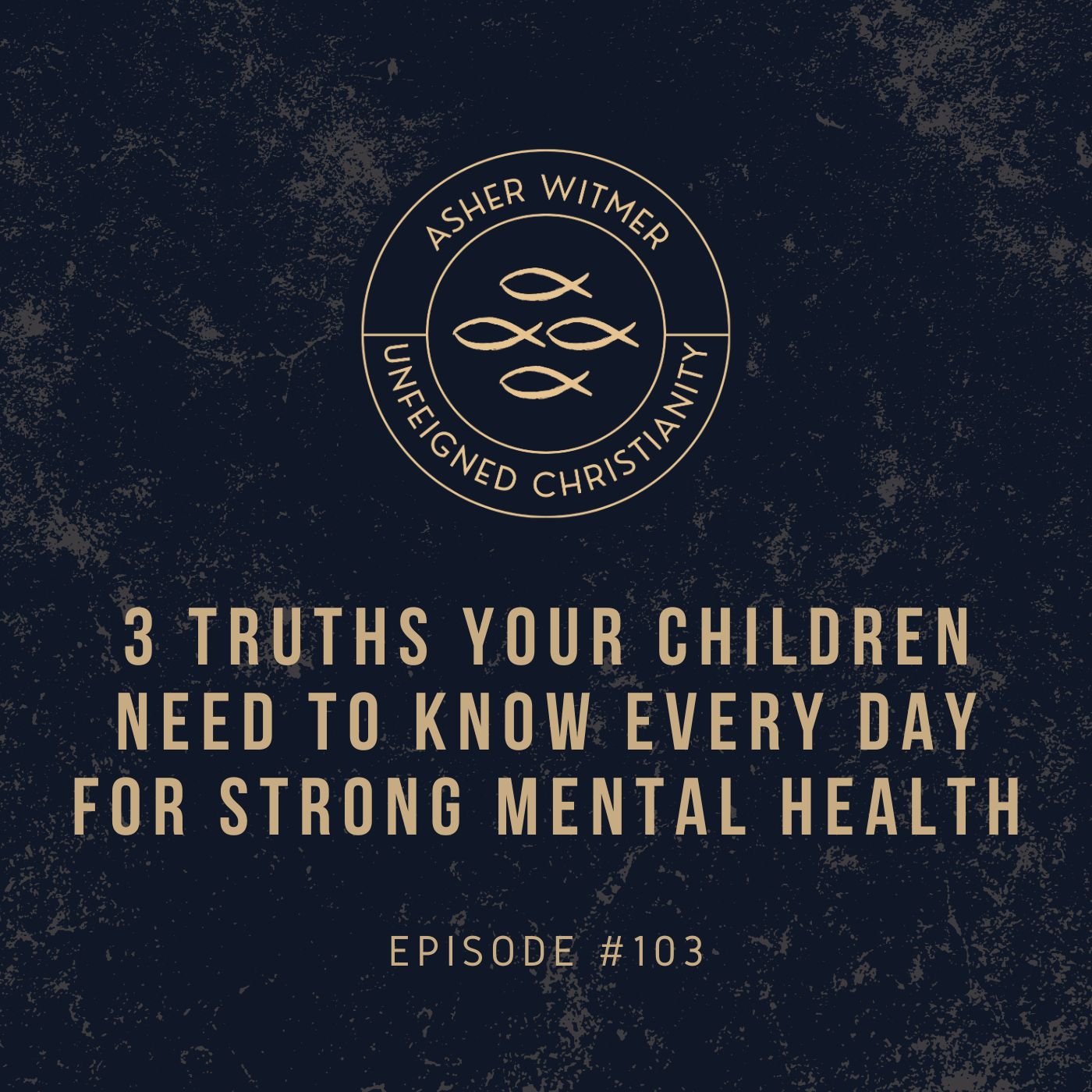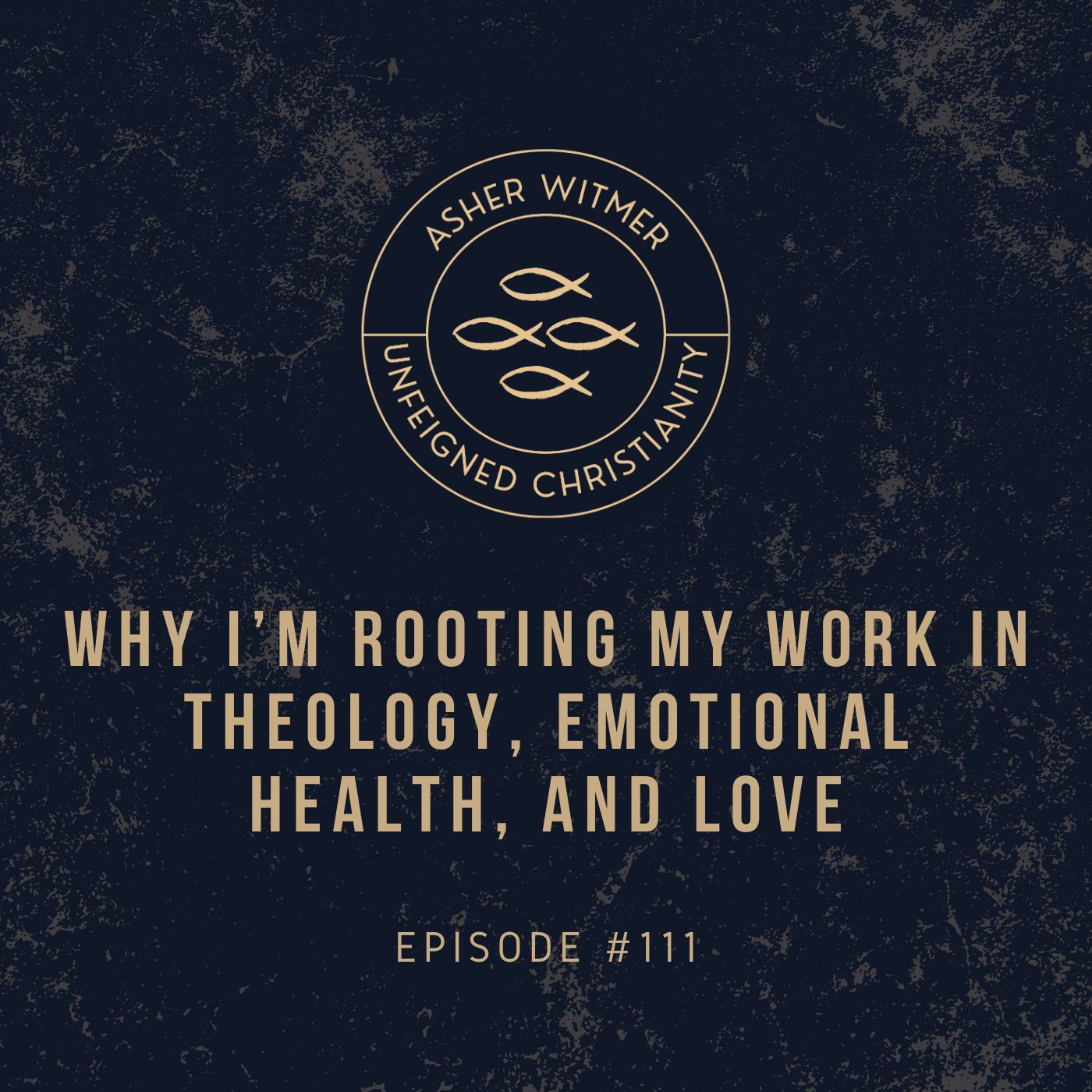Episode Transcript
[00:00:00] There are three things your children need to know every day for strong mental health. My name is Asher Whitmer with Unfeigned Christianity. And in the last number of years, I have become increasingly passionate about mental health. Obviously because of my own journey. I care a lot about mental health for men and for fathers. But something that I've been learning in my own journey is the need to begin developing strong mental health in my children. And I'd like to tell you about those three things that I have discovered I need to reinforce and find ways to communicate it to my children on a daily basis. Obviously, my children, My oldest is 11 years old, almost 12, my youngest is 1, and we have 5 kids total. So they're, they're. We're very much in the thick of continuing to train and learn. And there's going to be things we learn along the way. And I don't even know yet just how powerful these things will be or won't be in their life growing up. But as I reflect on my own journey, I know that these things would have been valuable to be ingrained as a child. And I don't say this to blame my parents. There's a lot they didn't know about or weren't aware of what was going on in my life and so forth. I've also, as I study psychology and emotional health, I realized these are true not just from my experience, but also in what psychologists and therapists are discovering and realizing in children as well. And I'll just, before I dive into these three, I would just like to say, first of all, I think it's really crucial that we are disciplined and teach our children a healthy relationship with media. And I'm including media as a, as a large category. That's another video for another time. But in that category, I certainly include social media.
[00:02:06] Media in general will affect mental health, but when you add on top of that social media and tracking likes and what other people, you see what other people are doing. I don't see any reason for children to be on social media before they're 15, 16 years old. And even at that, even adults, we need to understand how social media affects our mental health. But I just wanted to say that because I'm not going to address that in these three truths or these three things children need to learn. And here's the first thing. The first thing children need to learn is that they are loved not because of what they can do, but because of their identity, because of who they are. They have value because of their identity as opposed to Finding their identity in the thing that gives them value.
[00:03:01] I didn't know this as a kid. I don't. Again, I'm not saying this to blame my parents. Rather, I'm just speaking of what I've learned in my own journey and how can I help my children where they are. Obviously, I said, My oldest is 11, and I've just been learning these things in the last couple of years. So he's got at least nine years of me failing to communicate this over and over. But one of the ways I practice this is I try to every day. And I don't do it perfectly every day, but I try to every day communicate to my kids that I love them. I love them when they're at their best. I love them when they're at their worst. And then I'll ask, do you know why I love you? And then I'll follow up, I love you because you're my son, or I love you because you're my daughter.
[00:03:49] The reason they are loved by dad is because of their identity. It's not because of what they can do that has value. It's because of who they are. And then I bridge that through the course of conversation, maybe even right in that moment to God loves you even more perfectly than I do. Because ultimately I'm a flawed person. I can say I love them, but there's going to be times, even though I don't like it, there's going to be times when the way I interact with them doesn't strike them as loving, doesn't or just plain isn't loving.
[00:04:28] And those are moments for repair and reconciliation. But God loves them perfectly. And he's the One who gives us our identity as human beings. We are made in his image and we're his children. That's what gives us identity. We don't find our identity in what gives us value. We have value because of our identity, because we are God's children. My children have value because they are my children. I love them because they are my children. Their value doesn't come in what they can do or what brings fulfillment to them. So that's the first truth. They have value because of their identity. They don't find their identity in what they find value. What feels valuable to them, does that make sense? The second thing they need to know is that they matter to someone. Specifically today. Showing up matters to them. And this is something I've really recently started communicating to my children because I've noticed I've got some sons who are getting to the age where I've noticed levels of depression that can even rise in different seasons of the day, different seasons of the year, different activities going on. Even I've noticed it affected by how Teresa and I are doing emotionally and mentally. But I've noticed subliminal depression rising and falling and even some of our kids saying things that my wife and I are like, where's that coming from? And I've started. I want to tap into them right now, every day that they matter to somebody today. And so here's what I've been doing to my children when they wake up or. Or just sometime as I think about it, it's not necessarily every day that I tell each kid this, but I try to frequently get around. We've got five kids, obviously, one of them is one years old. She. She's not going to register with all that, but try to communicate this to four of them. And that is every day. When I wake up and I see you, it brightens my day.
[00:06:39] I want them to know that there's something worth getting up for, that somebody is looking forward to seeing them that day, that it matters, because that later on in life, and I'm sure you've been there, but there's going to be a moment in life. There's lots of moments in life, even as kids and as youth, where you don't even consciously realize you're asking that question. And I, in my. I've got kids who are in moments of anger and frustration, leaking that question. I don't think they're aware of that, but is, nobody cares about me. Nobody values me. I want them to know that somebody is looking forward to them coming upstairs or coming out of their room that day, no matter what's going on. It could be cold and winter. It could. We could all be tired and sick. Last week, we. Or a couple of weeks ago, we all, our whole household, had the flu and fevers, and it was just miserable. But even in that all, every day when I wake up and I see you, it brightens my day. And then the third truth, or the third thing they need to know is not so much a group of words or an expression, but they need to have something in their life that's slightly challenging, attainable for them. It's not like this big mountain of a challenge that stresses them out, but it causes them to rise up.
[00:08:07] And yet they can see how their contribution is adding value to those around them. So an example would be, I've got a couple of kids who love to build things. And so over Christmas, we bought them a bandsaw and they can start cutting out different things and being more creative in their woodworking and. And it's challenging. There's some danger involved. I've got boys who are 11 and 10 years old, and I guess I'm saying this publicly if it's on YouTube, understand that there is parental observation and teaching how to use this carefully and so forth, because I don't want them to cut any fingers off or anything. But that risk of like, ooh, this is a power tool. But then showing them how they can be creative in that, giving. Giving them something they can do and create something. And to be honest with you, my wife and I sometimes see the things that they create, and we're like, oh, cool. Like, there could be a lot of improvement.
[00:09:07] But that's the point. That's the point. It's challenging. It's forcing them to be creative. It's forcing them to learn a skill. But they're beginning to see contributions. And we've already. My wife through for. We homeschool our children, and we're part of a homeschool group. And they had a Christmas party, and she threw the. She was responsible for the Christmas party and part of the decorations. She wanted little pieces of pine wood that. The cards on the tables, whatever. I don't even know what cards she was putting in them, but that it was the stand for the cards. And my boys, I think I helped cut. Cut out some prototypes for them to follow and then showed them how to sand it down so that it feels smooth but can maintain its kind of rustic, wintery texture. And then my boys did the rest of them. There were like 12 that they needed or something. And they.
[00:10:06] My child is screaming upstairs.
[00:10:10] Pardon the noise, but they. It just brings out the best of them. They're. They're alive. They. They come in. Recently, we've had crazy cold weather, and during this crazy cold weather, they're into building a campfire out in our patio. And so all of our kids were dressed up and out on the patio and doing campfire camp mountain pies in the campfire and so forth. And they come in and they're just cold and exhausted. But they have that sense of purpose. And they're. They see, it's in moments like that where each of them can see. Maybe there's a bit of a challenge to slightly risk. How do I learn to be careful with a saw? How do I start a fire safely? How do I cook something? My oldest son was doing the cooking, and he was burning everything, and he was kind of discouraged but we wanted to reinforce like everybody starts out burning things when they start learning over the fire. And so like that's, that's a part of learning. You're learning how to control heat, how to, you know, you don't want big flames when you're cooking on the fire. You want hotter coals. My point is something that is attainable. They can do it, they have interest in but it's slightly challenging and when they do it, they can begin to see how they have something to contribute to the world around them. So I just want to leave that with you guys real quick. The three things again just to reiterate is their value is found in their identity as opposed to finding their identity in what makes them feel valuable. Secondly, somebody's day is brightened because they're in it. They matter to somebody today specifically. And then thirdly that they can see something, particularly something that raises their level of challenge and skill but that they can see they can contribute positively to those around them sa.




